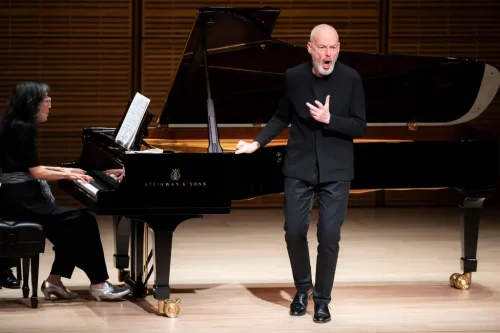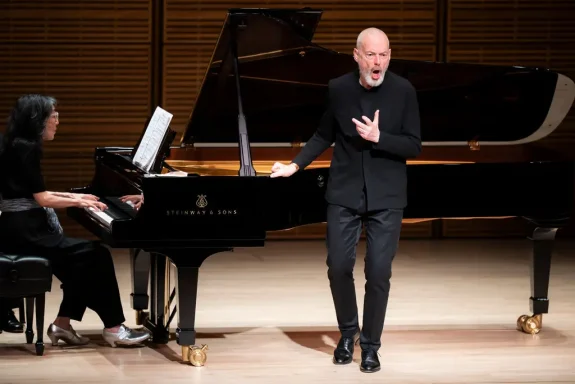 United States Schubert, Winterreise: Mark Padmore (tenor), Dame Mitsuko Uchida (piano). Cal Performances. Hertz Hall, University of California, Berkeley. 17.3.2024. (HS)
United States Schubert, Winterreise: Mark Padmore (tenor), Dame Mitsuko Uchida (piano). Cal Performances. Hertz Hall, University of California, Berkeley. 17.3.2024. (HS)

Schubert – Winterreise Op.89, D911
Leave it to a couple of veteran classicists like Mark Padmore and Mitsuko Uchida to craft Schubert’s Winterreise into a performance of eloquence from understatement rather than outward histrionics.
Their traversal of this well-traveled song cycle at Hertz Hall conjured up a meaty range of fleeting images. They beautifully conveyed the contrasts between overwhelming grief and transient hope in Schubert’s music and Wilhelm Müller’s poetry. A full house remained rapt and silent through it all, allowing Padmore’s slender tenor and Uchida’s understated piano to create evocative mind-pictures.
Padmore, an Englishman known for his lyric tenor roles, stood quietly through most of the performance, his knees often slightly bent to suggest the protagonist’s woebegone grief and rudderless mien upon losing his lover. He used only minimal vibrato, the straight tone amplifying the sense of alienation is the words.
The first song, ‘Gute Nacht’, was a study in diminuendos, each line starting with clear presence and gradually sinking along with the minor-key melodic line to a muffled softness. Even the last verse, for which Schubert shifts into major, kept the same tone instead of suggesting any sort of uplifting.
Uchida at the piano, in the first of two Berkeley concerts (next Sunday it’s Mozart with the Mahler Orchestra), resisted any urge for show-off pianism, instead caressing Schubert’s exquisitely crafted music, even in passages usually played with virtuosic flair. She brought out subtle details in tone to distinguish the text’s shifts. These efforts were especially fragrant in ‘Der Lindenbaum’, which she played with a seamless legato. She colored the initial fond memories of lovesick carvings on a tree with a different hue from the cold wind of bitterness at the end of the song and, despite a slow tempo, there was a steady pace in the walking music underlying it. The tempo allowed space for Padmore to tell the tale gracefully.
Her playing helped frame such songs as ‘Gefrone Träinen’, which relished the pointed rhythms depicting the frozen drops without overdoing it. The brisk tempo of ‘Rückblick’ underlined the song’s fleeting ‘backward glance’, and Padmore responded with crisp patter.
He found a softer tone for the last stanza of ‘Die Wetterfahne’, when the atmosphere changes from a picture of the wind-rocked weathervane to its echoes indoors. The tenor conveyed a sense of humility and dignity for ‘Auf dem Flusse’, answering the quiet ripples from the piano with a sense of wonder at the memory. ‘Frühlingstraum’ had clarity and sweetness, even in a voice without vibrato. There was never a sense of reaching for high notes, not even in the ‘Die Post’, where the music ventures above the staff before falling into resignation.
There was a welcome unanimity in all these details. Especially fine was the way that they would, as one, hold a pause a bit longer or decide when to push the tempo. This produced a feeling of naturalness in the storytelling as well as the music.
In the final song, ‘Der Leiermann’, a slower than usual tempo and an almost withdrawn aspect to the vocal lines made the moment especially heartbreaking. Our narrator encounters a hurdy-gurdy player standing on the ice but continuing to grind out the music and considers giving up entirely and joining him. Even without histrionics, this quiet approach created precisely the ambiguity Schubert wanted.
After the recital, leaving the sadness inside and stepping into the sunny spring weather outside the auditorium somehow did not make the experience even more morose. The musical interpretation left me with an unexpected sense of hope, that maybe our wanderer might actually have found solace at the end.
Harvey Steiman
